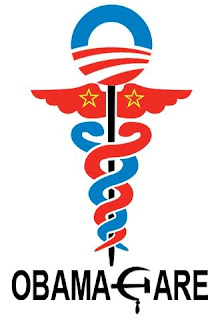Pete the Banker says:
The one major area of the economy that has been working well over the past nine months is Healthcare, having added jobs while continuing to provide innovative medical techniques, services, equipment and drugs to the benefit of Americans. Despite this, the Administration and Congress wish to “change” the Private Health Care Insurance industry, potentially imperiling the private health insurance coverage of millions of Americans and the Health Care Industry itself.
The Democrats welcomed the pronouncement from the CBO that the cost of the Health Care Bill before the Senate would be only $829 Billion. But that is far from the only cost levied on Americans. NPR stated of the cost estimate of the CBO , “Majority Leader Harry Reid said the Finance Committee will vote Tuesday on a 10-year, $829-billion proposal that would expand coverage to 94 percent of eligible Americans—while reducing the federal deficit.” The costs recited here include subsidies for the uninsured plus a number of new spending programs including everything from upgrading public health system infrastructure to mandating and regulating nutrition labeling on national restaurant chain menus. These costs are somewhat offset by taxes inserted into the legislation.
But there are other Health Care costs that will result from the legislation not included in the above number,
- The Senate version of the Healthcare Bill will be costly to Seniors. It removes $500 Billion dollars from Medicare over 10 years, and despite assertions of the President it can be accomplished through a reduction in waste and fraud, the CBO has suggested that such savings are less than 1/10th that amount. Thus, this reduction will cost seniors a permanent loss in services and benefits and perhaps availability to doctors willing to see Medicare patients.
- Direct taxes levied on the premiums of so called “high premium/high benefit” private insurance plans, which basically includes all existing private Health Insurance plans covering some 240 million+ Americans, will drive up premiums on existing private medical insurance. New taxes on medical services, medical equipment, and drugs will similarly drive up medical costs. Nancy Pelosi has proposed an additional excess profit tax in recent days which will also20inflate premiums for insureds. Tax deductions on medical care will allegedly disappear similarly making medical care more expensive.
- The proposal before the Senate establishes State Gateways (in the House its Federal Healthcare Exchanges) and provides Certified Plans for the current uninsured individuals at pre-approved federally promulgated cost sharing levels. Cost sharing simply defined, establishes maximum reimbursement levels or tiers (Tier 1 – 76%, Tier 2 – 68%, Tier 3 – 59%) which are well below current reimbursement levels to consumers covered under private Heath Insurer’s Plans which now average closer to 85% of out of pocket costs.
It won’t take long for the typical business to figure out that the Certified Plans offered under these State Gateways will be far less expensive than the higher cost private plans they currently offer. Over time businesses will gravitate toward the lower cost/lower benefit State Certified plans as a defensive measure especially when forced to pay taxes for their existing “high premium” (high benefit) plans and if faced with continuing economic weakness.
The change from private plans to public Certified Plans will translate into a decrease in the employee insurance reimbursement under the new Certified Plans and an increase in out of pocket cost of the insured individual of 9% – 27% of their annual med ical costs. This decline in reimbursement levels was the subject of the Business Week article “The Health Insurers Have Already Won ” in the August 17, 2009 issue (Here).
The above costs don’t begin to cover the more incalculable and intangible costs/losses involved in the implementation of massive changes to the Medical and Medical Insurance industry which will cause disruption to the existing medical and drug delivery systems, not the least of which will be the loss of a significant number of existing medical personnel and doctors. Nor do they address the costs involved in the phase out/deprivation of existing Insurance Plan benefits by the Secretary of Health and Human Services, the loss of doctor/client privilege, the loss of an individual’s choice of medical treatment options, and the potential loss of incentive for development of new techniques, medical equipment and drugs.
If the uninsured were really the primary reason driving the Health Care Legislation, wouldn’t subsidies and the elimination of insurance coverage restrictions be a far more pragmatic and efficient method of accomplishing the goal? Why is it necessary that under both the House and Senate legislation that the Secretary of Health and Human Services and her Washington DC based unelected committees restrict covered benefits, establish actuarial value of benefits and reimbursement levels? Are these bills really about helping the uninsured or simply about establishing tighter control over your medical options, the Medical Insurance and Medical Industries?




